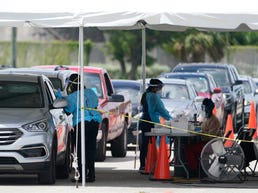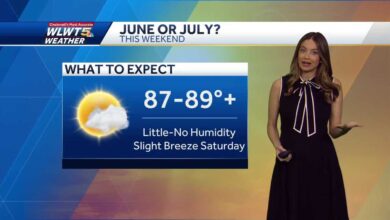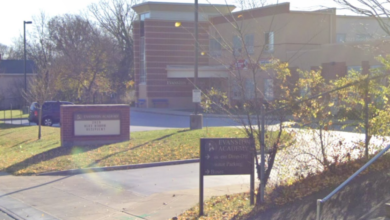
Eight months after first authorizing the Pfizer-BioNTech COVID-19 vaccine for emergency use in the United States, the Food and Drug Administration has issued its full stamp of approval.
Now that the companies' detailed, so-called biologics license application has been granted, it's expected vaccination will be required by many companies, schools and other entities.
The FDA decision also clears the way for the companies to market their vaccine, which is not permitted without full licensure. And it may launch a race for booster shots, allowing doctors to prescribe extra Pfizer-BioNTech shots "off label" to anyone they think should get one.
The FDA confirmed late last year through a more streamlined evaluation process that the vaccine, from pharmaceutical giant Pfizer and its partner German startup BioNTech, was safe, effective and could be reliably produced.
The review of the 340,000-page license application was completed in just 97 days, with FDA staff working "night and day," said Dr. Peter Marks, director of the Center for Biologics Evaluation and Research at FDA, which approves vaccines
"We completed this in about 40% of the normal clock time for a submission of this magnitude," he said.
The license application included more than 340,000 pages of material, three times the earlier emergency use authorization submission, which weighed in at 110,000 pages.
The companies have manufactured more than 2 billion doses, with over 200 million administered in the U.S., the most of any of the three vaccines currently allowed for use in the country.
Dr. Anthony Fauci: Expect 'a flood' of COVID-19 vaccine mandates after full FDA approval
The full license includes four more months of efficacy and safety data, confirming earlier trial results and detailing manufacturing processes.
The Pfizer-BioNTech emergency use authorization was based on clinical trials involving about 37,000 people. The full approval was based on study results involving more than 44,000 people followed for six months.
The license only applies to those 16 and over, but the vaccine will continue to be allowed for those 12 to 15 under the previous authorization.
“Based on the longer-term follow-up data that we submitted, today’s approval for those aged 16 and over affirms the efficacy and safety profile of our vaccine at a time when it is urgently needed,” Pfizer chairman and CEO Albert Bourla said in a statement. “I am hopeful this approval will help increase confidence in our vaccine, as vaccination remains the best tool we have to help protect lives and achieve herd immunity."
Acting FDA Commissioner Dr. Janet Woodcock said she hoped the approval would help alter the course of the pandemic in the United States.
“The public can be very confident that this vaccine meets the high standards for safety, effectiveness, and manufacturing quality the FDA requires of an approved product,” Woodcock said in a statement. “While millions of people have already safely received COVID-19 vaccines, we recognize that for some, the FDA approval of a vaccine may now instill additional confidence to get vaccinated.”
The full authorization process involves more data and more time in part because once a drug or vaccine is authorized by FDA, doctors are able to prescribe it "according to the practice of medicine," also known as off-label.
Before the approval,Marks said the approval allows for a "broader potential use" of the vaccine, "not that we're recommending off-label uses."
"When we give a biologics license, we are really saying that we have a lot of confidence in that product, in the safety, efficacy, manufacturing information, not just when it's used exactly according to how it's labeled, but potentially if it were used somewhat differently by physicians," he said.
Woodcock said in a Monday news conference that she hoped doctors would not prescribe the vaccine to children under age 12 for whom the vaccine has not yet been approved. The appropriate dose for younger children has not yet been determined, she said.
This ability to prescribe off-label also means doctors can authorize people to get an extra Pfizer-BioNTech shot, even before booster shots are made available to the general public likely to begin the week of Sept. 20.
"It might discourage people from waiting eight months" to get a booster shot, as the administration recommends, said Dr. Jesse Goodman, an infectious disease specialist at the Georgetown University School of Medicine.
And it might make it harder for people who are immunocompromised, who are allowed to get boosters now, to access shots, said Norman Baylor, president and CEO of Biologics Consulting. "It could create a competition for the immunocompromised," he said in a call last week with reporters.
But otherwise, the change will be mostly psychological, he said in an interview.
"Really, there are not major differences," said Baylor, who spent 20 years with the FDA, including running its Office of Vaccines Research and Review.
The legal backing of full approval means more businesses and schools will start requiring theCOVID-19 vaccine, said Dorit Rubinstein Reiss, a law professor at the University of California, Hastings College of the Law, and an expert on vaccine requirements
"Most places which are nervous about the EUA will likely move immediately as soon as there's a BLA," she said.
Some people reluctant to take a vaccine authorized for emergency use may be willing to get a vaccine that has full approval, Dr. Anthony Fauci told USA TODAY's editorial board earlier this month.
"When the FDA, God bless them, finally go from an EUA to a BLA, I believe that a certain number of people will spontaneously make the decision that, 'OK, now I'm convinced. I'm going to get vaccinated,'" he said.
In one recent poll, 72% parents of children ages 12 to 17 said full approval would make them more confident in the safety of the vaccines.
Full licensure also means Pfizer-BioNTechwill be allowed to advertise their vaccine.
The FDA also required the companies to continue to study their vaccine to "further assess the risks" of swelling of the heart after vaccination.
Since April, more than 1,300 people have reported developing myocarditis or pericarditis after vaccination with either the Pfizer-BioNTech or Moderna vaccine. Most cases were in young men, occurred within a few days after vaccination, and responded well to treatment.
Pfizer-BioNTech has also agreed to conduct a pregnancy registry study to evaluate pregnancy and infant outcomes after vaccination during pregnancy.
Moderna has already begun the process of applying for a full license and Johnson & Johnson – which makes the other COVID-19 vaccine authorized for emergency use in the U.S. – plans to apply later this year.
Vaccine experts reacted positively Monday to the FDA's approval of Pfizer-BioNTech's vaccine, now called Comirnaty.
“This confirms the safety and incredible effectiveness of this vaccine," Dr. Richard Besser, president and CEO of the Robert Wood Johnson Foundation and former acting director of the CDC, said in a statement. "I am hopeful that full approval will address any remaining concerns and will move many people to a ‘yes’ on vaccination."
He said the timing of full approval is crucial, with delta continuing to "drive up caseloads and deaths across the U.S." With delta accounting for virtually all cases, Americans have reported an average of 130,000 new infections every day for the last week and more than 700 deaths.
“FDA’s full approval today of the Pfizer-BioNTech vaccine is great news and it marks a major accomplishment for humanity," Dr. Jesse Goodman, professor of medicine and infectious diseases at Georgetown University Medical Center said in a statement.
“I hope that knowing FDA experts invested tremendous time and effort to perform this complete and independent review, while the vaccine has been available for emergency use, now helps anyone who still has concerns gain confidence," he said. “Getting vaccinated now remains the best way to reduce the risk of hospitalization and death from the virus and to help control the terrible toll of this pandemic.”
About 30% of unvaccinated people in recent polls said they were waiting for full approval to get vaccinated, noted a joint statement from the American Medical Association, the American Hospital Association and the American Nurses Association.
“If uncertainty was holding you back, now is the time to act," according to the statement.
"And if you still have questions about the vaccines or about COVID-19, please consult your health care professional."
Contact Karen Weintraub at [email protected] and Elizabeth Weise at [email protected].
Health and patient safety coverage at USA TODAY is made possible in part by a grant from the Masimo Foundation for Ethics, Innovation and Competition in Healthcare. The Masimo Foundation does not provide editorial input.
Source link







